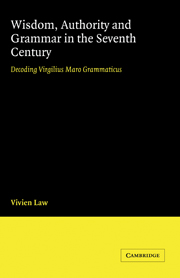Book contents
- Frontmatter
- Contents
- Preface
- Abbreviations
- Introduction
- 1 The outer layers: parody and word-play
- 2 The wisdom tradition
- 3 Avarice and the four keys to wisdom
- 4 The multifarious nature of wisdom
- 5 Heretical knowledge? The constitution of man
- 6 The Epistolae: Virgilius' Retractatio?
- 7 Concealment of mysteries: the techniques of secrecy
- 8 Virgilius and the seventh century
- 9 Conclusion
- Appendix 1 Epistola II 14-93: The vocative of ego
- Appendix 2 Epitome XV: The catalogue of grammarians
- Notes
- Works cited
- Index
6 - The Epistolae: Virgilius' Retractatio?
Published online by Cambridge University Press: 10 November 2009
- Frontmatter
- Contents
- Preface
- Abbreviations
- Introduction
- 1 The outer layers: parody and word-play
- 2 The wisdom tradition
- 3 Avarice and the four keys to wisdom
- 4 The multifarious nature of wisdom
- 5 Heretical knowledge? The constitution of man
- 6 The Epistolae: Virgilius' Retractatio?
- 7 Concealment of mysteries: the techniques of secrecy
- 8 Virgilius and the seventh century
- 9 Conclusion
- Appendix 1 Epistola II 14-93: The vocative of ego
- Appendix 2 Epitome XV: The catalogue of grammarians
- Notes
- Works cited
- Index
Summary
The Epitomae, with its kaleidoscopic messages of multiplicity and quiet insistence upon the fire of the spirit, found a ready welcome among grammar teachers, to judge from its transmission: in the later eighth century it was incorporated into a number of codices which contained collections of grammars. Some monastic instructors, at least, felt no hesitation in preserving it, whatever they made of its message. The relatively large number of extant manuscripts and fragments of the Epitomae up to about the middle of the ninth century, and borrowings by authors such as Boniface and Bede, suggest that grammarians valued it highly. But not all its readers appreciated it. Virgilius' inflammatory rejoinder to his critics, part indignant, part defensive, at the start of the third Epistola makes it clear that his message of plurality had met with a poor reception in some circles at least:
Before we put our hand to the explanation of the verb, on which we contributed some brief but wide-ranging remarks in the Epitomae, I think it is appropriate to reply to those who bark and snap at us with their unhallowed fangs, accusing us of appearing to contradict ourselves in our various arts when what one says, another apparently tears to shreds. They do not realise that Latin is so huge and so profound that to expound it fully one must use a multiplicity of methods, words, forms and meanings.
- Type
- Chapter
- Information
- Wisdom, Authority and Grammar in the Seventh CenturyDecoding Virgilius Maro Grammaticus, pp. 77 - 82Publisher: Cambridge University PressPrint publication year: 1995

